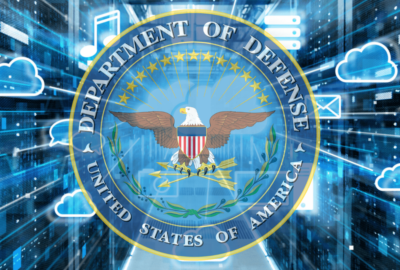
No political influence in JEDI decision, Pentagon says
DoD's chief information officer told lawmakers the White House could not have interfered with the JEDI decision because the identities of the team that made the...
The Pentagon’s top IT official said Tuesday he was confident in the integrity of the selection process the Defense Department used for its massive JEDI Cloud contract, mainly because of a series of firewalls the department set up as the decision process neared its final days.
Dana Deasy, DoD’s chief information officer, said it would have been close to impossible for the White House or anyone else to interfere with last week’s contract announcement, mainly because his office decided to make the names of the procurement experts who made the final decision a closely-guarded secret.

“We have kept the identities of every member of the source selection team anonymous throughout this process,” he told the Senate Armed Services Committee. “In my discussions with the deputy secretary of Defense and the secretary of Defense, at no time throughout this process have I ever shared any proprietary source information with them, nor have I ever divulged — when we got to the conclusion — who the awardee was.”
The Pentagon announced last Friday that it had given the up-to-$10 billion contract to Microsoft. The decision surprised observers of the long-running JEDI saga, as most had expected the award to go to the only other remaining contender, Amazon Web Services.
It also raised suspicions of political interference in light of a history of negative remarks President Donald Trump has made about Amazon and its founder, Jeff Bezos, and the president’s assertions that his administration was “getting tremendous complaints” about JEDI and was “looking at it very seriously.”
But Deasy testified that to the best of his knowledge, no one from the White House had made contact with any of the members of the source selection team.
He said his practice of segregating JEDI decision-making processes extended back to May 2018, when he first became DoD’s CIO and began asking questions about how the contract would fit into the department’s broader IT modernization strategy.
“We went out and found approximately 50 government civil servants that were experts in cloud computing and we compartmentalized them and we segregated them into teams,” he said. “At no time did one team have access to what the other team was working on.”
Deasy didn’t elaborate on what those teams wound up recommending, but by July, the department had released a final request for proposals that was mostly in keeping with the approach DoD had already announced to industry several months earlier: A 10-year contract that would be awarded to only one vendor.
Related Stories
“We’re surprised about this conclusion,” a company spokesperson said in an emailed statement. “AWS is the clear leader in cloud computing, and a detailed assessment purely on the comparative offerings clearly lead to a different conclusion. We remain deeply committed to continuing to innovate for the new digital battlefield where security, efficiency, resiliency, and scalability of resources can be the difference between success and failure.”
Assuming it requests and receives a debriefing, AWS would have another 10 days to file a formal bid protest with the Government Accountability Office; it could also choose to challenge the decision at the Court of Federal Claims.
Considering how long the JEDI contracting process has already taken, it’s likely that both AWS and Microsoft have already gamed out strategies for how they would approach a bid protest, said David Berteau, a former longtime Defense official who now heads the Professional Services Council.
But he said allegations of improper political influence are unlikely to be a factor — at least in the case of a potential GAO protest — since GAO’s review process is almost entirely about whether the government followed the source selection procedures it told vendors it would use when it released the initial RFP.
“I don’t see that [the president’s comments] play a role at all,” he said. “In everything I’ve seen from protests I’ve been involved in, as a protester, as a defendant, as a government program official, GAO does a very good job of ignoring that. It might be a different case in a lawsuit though, because it depends on the basis of the suit, what the allegations are, and what the remedies are that are sought.”
Amazon already plays an outsized role in DoD’s cloud ecosystem, and has managed to win a major share of the department’s commercial cloud business outside of JEDI.
For example, just this week, the Navy is wrapping up a major migration of its Navy Standard Integrated Personnel System from its own data centers to Amazon’s GovCloud. Earlier this summer, the Navy also moved one of the world’s biggest enterprise resource planning systems, Navy ERP, to AWS.
Deasy told the Senate on Tuesday that DoD’s various components have already entered into commercial cloud arrangements that his office sees as “disparate” and difficult to integrate with one another. Nonetheless, he said, JEDI is not intended to subsume all of them.
“We are not putting all of our data onto a single cloud,” he said. “That’s never been the purpose of JEDI, and in the last two years alone, we’ve issued 10 distinct cloud contracts. JEDI is a unique capability that allows us to move between different classification levels and put information out to the tactical edge, but it’s not going to be our only cloud.”
The Pentagon made a similar assertion about its “multi-cloud” intentions on Friday, when it announced the long-awaited JEDI decision while also seeming to downplay its significance by saying it would continue to pursue “various cloud contracting opportunities to diversify the capabilities of the DoD Enterprise Cloud Environment.”
In response to questions from Federal News Network, Defense officials released a list of the recent Defense contracts that Deasy’s office considers to be legitimate parts of the department’s “cloud enterprise.”
One of the 10 is a classified contract, the Pentagon said. The other nine, along with their total ceiling values are:
- The Air Force’s Cloud Hosted Enterprise Services (CHES) — $1.1 billion
- The Defense Information Systems Agency’s milCloud 2.0 — $500 million
- Defense Enterprise Office Solutions — $7.8 billion (estimated, not a ceiling; now under revision.)
- Navy Enterprise Resource Planning — $100 million
- Air Force Cloud One — $790 million
- The Defense Manpower Data Center’s Human Capital Management — $40 million
- Navy Commerical Cloud Services — $96 million
- Air Force A1 Oracle Service Cloud Contract — $30 million
- Air Force A1 Virtual Data Center Initiative — $38 million
Copyright © 2025 Federal News Network. All rights reserved. This website is not intended for users located within the European Economic Area.
Jared Serbu is deputy editor of Federal News Network and reports on the Defense Department’s contracting, legislative, workforce and IT issues.
Follow @jserbuWFED






